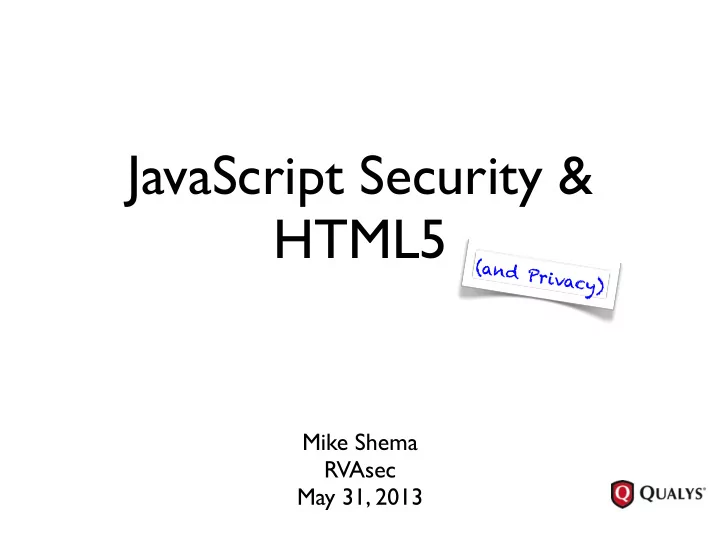

JavaScript Security & HTML5 ( a n d P r i v a c y ) Mike Shema RVAsec May 31, 2013
We’ve Been Here Before
A Definition Ja 𐄂 va 𐄂 Script | ˈ jäv ə skript | invective . 1 A vendor-neutral, cross-platform liability for * generating asynchronous, event-driven browser bugs. 2 Interpreted language for exploiting string concatenation in HTML. * mostly
let me = count(ways); 1 script 7 years ~1800 bugs var Pwn2Own = $money CVE-2012-4969 = ~12 lines of HTML
D Subtle and Quick to Anger ^ • Programming traps • Scope, blocks, & var • Types & type coercion typeof null == "object"; typeof undefined == "undefined" null == undefined; X null === undefined; // nope! (window[(![]+[])[1] + (![]+[])[2] + (![]+[])[4] + (!![]+[])[1] + (!![]+[])[0] ])(9)
JavaScript Crypto ☣ • Use TLS for channel security • Better yet, use HSTS and DNSSEC. • No trusted execution environment in... • ...the current prototype-style language • ...an intercepted HTTP connection • ...an exploitable HTML injection vuln
JavaScript Crypto ☣ • Math.random() • sjcl.random • window.crypto • Fortuna-like generator • Not standardized • Entropy estimator • Exceptions sjcl.random.addEntropy([x,y], 2, "mouse") sjcl.random.addEntropy((new Date()).valueOf(), 2, "loadtime"); sjcl.random.addEntropy(ab, 1024, "crypto.getRandomValues"); // WebKit
JavaScript Crypto ☣ • Minimize lifetime of plaintext password • Client-side PBKDF2 • Challenge-response • ...but possibly lose some security insights • Password composition, history • Patterns of brute force activity
1996 ꜜ <!doctype html>
f Internal Browser Security • Process separation • Phishing warnings • Sandboxing plugins • Primarily for known sites • HTML5 does away • Some behavioral with plugins altogether patterns, e.g. URL authority abuse • XSS Auditors • Auto-updating • Only for the simplest scenarios
HTML Injection • The 20+ year-old vuln that refuses to die. • But JavaScript makes the situation better! • No, JavaScript makes the situation worse! • HTML5 to the rescue! ?
Oh, No! XSS Is Worse! http://web.site/vuln?foo=xss"... <input type="text" name="foo" value="xss"autofocus/ onfocus=alert(9);//"> (yawn)
XSS Blacklisting Is Worse • New elements, new attributes • Didn’t work in the first place • <img src=">"onerror=alert(9)> • <img src="\"a=">"onerror=alert(9)> • <a href=""&<img&/onclick=alert(9)>foo</a> • <script/<a>alert(9)</script> • <script/<a>alert(9)</script <a>foo</a> • <script%20<!–%20–>alert(9)</script>
Client-Side Validation
Same Vulns, New Exploits <img src="https://csrf.target/sensitive? action=something"> <link rel="prefetch" href="https:// csrf.target/sensitive?action=something"> • Origin • Referer • X-Moz: prefetch
Improving SOP • Granular access control • Whatever happened to least privilege? • Make the <iframe> more useful for isolating Origins • seamless • sandbox
<iframe * src="infected.html" "infected.html"> (empty) sandbox JavaScript not executed JavaScript executed document.cookie sandbox="allow-scripts" localStorage() sessionStorage() text/html-sandboxed Waiting for browser support
On the Other Hand... ...if you’re relying on JavaScript frame-busting instead of X-Frame-Options: DENY. function killFrames(){if(top.location!=location) {if(document.referrer){var a=get_hostname_from_url(document.referrer);var b=a.length;if(b==8&&a!="web.site") {top.location.replace(document.location.href)}else if(b!=8&&a.substring(a.length-9)!=".web.site") {top.location.replace(document.location.href)}}} if(top.frames.length! =0)top.location=self.document.location}function get_hostname_from_url(a){return a.match(/:\/\/(.[^/?] +)/)[1]}killFrames();
Content Security Policy • Granular access for retrieving resources • Header only • Probably requires code changes, or unsafe-eval • (http-equiv has lower precedence) • Waiting for universal implementation • X-Content-Security-Policy • X-WebKit-CSP • http://www.w3.org/TR/CSP/
Selective Resource Control X-CSP : default-src 'self'; frame-src 'none' <!doctype html> <html> <body> <iframe src="./infected.html"></iframe> </body> </html>
Defeat Exploits, Not Vulns X-CSP : default-src 'self' <input type="text" name="q" value=" foo" autofocus onfocus=alert(9)//" "> X-CSP : default-src 'self' 'unsafe-inline' <input type="text" name="q" value=" foo" autofocus onfocus=alert(9)//" ">
https://web.site/page#<img/src=""onerror=alert(9)> <!DOCTYPE html> <html> <head> <script src="jquery-1.8.2.min.js"></script> <script> $(document).ready(function() { var x = (window.location.hash.match(/^#([^\/].+)$/) || [])[1]; var w = $('a[name="' + x + '"], [id="' + x + '"]'); }); </script> </head> <body> <div id="main">foo</div> </body> </html>
https://web.site/page#<img/src=""onerror=alert(9)> <!DOCTYPE html> <html> <head> <script src="jquery-1.8.2.min.js"></script> <script src="main.js"></script> </head> <body> <div id="main">foo</div> </body> </html> $(document).ready(function() { var x = (window.location.hash.match(/^#([^\/].+)$/) || [])[1]; var w = $('a[name="' + x + '"], [id="' + x + '"]'); });
Decouple HTML & JS • Avoid “inline” event • Use event managers handler attributes $('#main').bind("click", $('#main').attr('onclick', function(e) { alert(9) }); 'alert(9)'); $('#main').click(function(e) { alert(9) }); $('#main').on("click", function(e) { alert(9) });
On the Other Hand... ...an awesome XSS DoS payload if injectable into a <head> section. <meta http-equiv="X-WebKit-CSP" content="default-src 'none'">
On the Other Hand... ...another way to forge POST method for CSRF. <!doctype html><html><head> <meta http-equiv="X-WebKit-CSP" content="img-src 'none'; report-uri 'https://csrf.target/page?a=1&b=2&c=3'"> </head><body> <img alt="" src="whatever"> </body></html>
Partial CSRF Influence POST /page?a=1&b=2&c=3 HTTP/1.1 Host: csrf.target User-Agent: Mozilla/5.0 ... Content-Length: 116 Accept: */* Origin: null Content-Type: application/x-www-form-urlencoded Referer: http://web.site/HWA/ch3/csrf.html Cookie: sessid=12345 Connection: keep-alive document-url=http%3A%2F%2Fcsrf.target%2FHWA %2Fch3%2Fcsrf.html&violated-directive=default- src+%27none%27
CORS • Defines read-access trust of another Origin • Expresses trust, not security • But still contributes to secure design • Principle of Least Privilege • Beware of Access-Control-Allow-Origin: * • Short Access-Control-Max-Age • Minimal Access-Control-Allow-{Methods | Headers} • Verify the Origin
On the Server • Origin, Referer, X-Forwarded-For • WebSockets • With support for legacy, draft protocol versions (!?) • Node.js • Implementing a web server, or a service?
Data = “.” [22:49:57][*] BeEF server started (press control+c to stop) /opt/local/lib/ruby1.9/gems/1.9.1/gems/json-1.7.5/lib/ json/common.rb:155:in `initialize': A JSON text must at least contain two octets! (JSON::ParserError)
* Capability, Security, Privacy “In a world with one eye on privacy, the blind browser is king.” • AppCache • WebPerf APIs • Battery Status • Browser Fingerprinting • Geolocation • Device Fingerprinting • Web Storage • Usage Statistics • WebGL • User Tracking * choose two (one?)
Privacy • Implementation vs. design • Specs that acknowledge areas of concern • Browser Fingerprinting • Inference-based attacks • Timing, cache • Data exposure • Web Storage API
end.isNigh()
JavaScript Will Improve • Libraries driving good design patterns • Steps towards a trusted environment • Freeze & Seal an Object • Object.hasOwnProperty() • Modular libraries • toStaticHtml() *
Mistakes Will Happen • Origin is an identity hint, not an access control attribute • The return of X-Forwarded-For • JSON serializes, not sanitizes, data • Avoid string concatenation • Review, refactor, refine
Security from Design • Strong solutions • SQL injection -- prepared statements • Clickjacking -- X-Frame-Options • Mitigating solutions • HTML injection -- Content Security Policy • Mixed-Origin content -- CORS, CSP , <iframe> sandbox • Sniffing -- HSTS • Implementation-specific solutions • CSRF -- hmm...
Recommend
More recommend